Early full enteral feeding for preterm or low birth weight infants
- PMID: 33368149
- PMCID: PMC8094920
- DOI: 10.1002/14651858.CD013542.pub2
Early full enteral feeding for preterm or low birth weight infants
Abstract
Background: The introduction and advancement of enteral feeds for preterm or low birth weight infants is often delayed because of concerns that early full enteral feeding will not be well tolerated or may increase the risk of necrotising enterocolitis. Early full enteral feeding, however, might increase nutrient intake and growth rates; accelerate intestinal physiological, metabolic, and microbiomic postnatal transition; and reduce the risk of complications associated with intravascular devices for fluid administration. OBJECTIVES: To determine how early full enteral feeding, compared with delayed or progressive introduction of enteral feeds, affects growth and adverse events such as necrotising enterocolitis, in preterm or low birth weight infants.
Search methods: We used the standard search strategy of Cochrane Neonatal to search Cochrane Central Register of Controlled Trials; MEDLINE Ovid, Embase Ovid, Maternity & Infant Care Database Ovid, the Cumulative Index to Nursing and Allied Health Literature, and clinical trials databases, conference proceedings, and the reference lists of retrieved articles for randomised controlled trials and quasi-randomised trials to October 2020.
Selection criteria: Randomised controlled trials that compared early full enteral feeding with delayed or progressive introduction of enteral feeds in preterm or low birth weight infants.
Data collection and analysis: We used the standard methods of Cochrane Neonatal. Two review authors separately assessed trial eligibility, evaluated trial quality, extracted data, and synthesised effect estimates using risk ratios (RR), risk differences, and mean differences (MD) with 95% confidence intervals (CI). We used the GRADE approach to assess the certainty of evidence.
Main results: We included six trials. All were undertaken in the 2010s in neonatal care facilities in India. In total, 526 infants participated. Most were very preterm infants of birth weight between 1000 g and 1500 g. Trials were of good methodological quality, but a potential source of bias was that parents, clinicians, and investigators were not masked. The trials compared early full feeding (60 mL/kg to 80 mL/kg on day one after birth) with minimal enteral feeding (typically 20 mL/kg on day one) supplemented with intravenous fluids. Feed volumes were advanced daily as tolerated by 20 mL/kg to 30 mL/kg body weight to a target steady-state volume of 150 mL/kg to 180 mL/kg/day. All participating infants were fed preferentially with maternal expressed breast milk, with two trials supplementing insufficient volumes with donor breast milk and four supplementing with preterm formula. Few data were available to assess growth parameters. One trial (64 participants) reported a slower rate of weight gain (median difference -3.0 g/kg/day), and another (180 participants) reported a faster rate of weight gain in the early full enteral feeding group (MD 1.2 g/kg/day). We did not meta-analyse these data (very low-certainty evidence). None of the trials reported rate of head circumference growth. One trial reported that the mean z-score for weight at hospital discharge was higher in the early full enteral feeding group (MD 0.24, 95% CI 0.06 to 0.42; low-certainty evidence). Meta-analyses showed no evidence of an effect on necrotising enterocolitis (RR 0.98, 95% CI 0.38 to 2.54; 6 trials, 522 participants; I² = 51%; very low-certainty evidence).
Authors' conclusions: Trials provided insufficient data to determine with any certainty how early full enteral feeding, compared with delayed or progressive introduction of enteral feeds, affects growth in preterm or low birth weight infants. We are uncertain whether early full enteral feeding affects the risk of necrotising enterocolitis because of the risk of bias in the trials (due to lack of masking), inconsistency, and imprecision.
Copyright © 2020 The Cochrane Collaboration. Published by John Wiley & Sons, Ltd.
Conflict of interest statement
VW: none.
JB: none.
BC: none.
SO and WM are the co‐investigators for the "Fluids exclusively enteral from day one in premature infants" trial (ISRCTN89654042).
WM is Cochrane Neonatal co‐coordinating editor.
Core editorial and administrative support for this review has been provided by a grant from The Gerber Foundation. The Gerber Foundation is a separately endowed, private foundation, independent from the Gerber Products Company. The grantor has no input on the content of the review or the editorial process (see Sources of support).
Figures

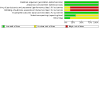
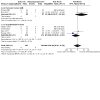

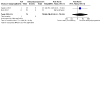
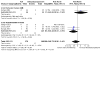
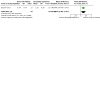
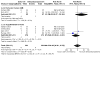
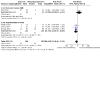

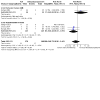


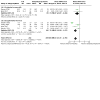
Update of
References
References to studies included in this review
Bora 2017 {published data only}
-
- Bora R, Murthy NB. In resource limited areas complete enteral feed in stable very low birth weight infants (1000–1500 g) started within 24 h of life can improve nutritional outcome. Journal of Maternal-Fetal & Neonatal Medicine 2017;30(21):2572-7. [DOI: 10.1080/14767058.2016.1256992] [PMID: ] - DOI - PubMed
Chetry 2014 {published data only}
-
- Chetry S, Kler N, Saluja S, Garg P, Soni A, Thakur A. A randomised controlled trial comparing initiation of total enteral feeds on 1st day of life with standard feeding regimen in stable very low birth weight infants born between > 30-34 weeks gestation and 1000-1500 gms. In: Pediatric Academic Societies Annual Meeting; 2014 May 3–6; Vancouver (BC). 2014:2390;442.
Jajoo 2017 {published data only}
-
- Jajoo M, Arora N, Dabas V, Talukdar B, Kumari S. Early total versus gradual advancement of early nutrition in healthy preterm very low birth weight neonates in a tertiary care nursery: a randomised controlled trial. In: Pediatric Academic Societies Annual Meeting; 2017 May 6–9; San Francisco (CA). 2017:3800;28.
Nangia 2019 {published data only}
Ramya 2014 {published data only}
-
- Ramya S. Does Full Enteral Feeding from Day One of Life Influence Weight Gain in Haemodynamically Stable Babies Weighing Between 1000–1500 Grams as Against Standard Feeding? An Open Label Randomised Controlled Trial [Dissertation]. Chennai (India): Tamilnadu Dr MGR Medical University, 2014.
References to studies excluded from this review
Genzel‐Boroviczény 2002 {published data only}
-
- Genzel-Boroviczény O, Göbel Y, Koletzko B. Effect of early enteral feeding on apolipoprotein A1 levels and high-density lipoprotein heterogeneity in preterm infants. Annals of Nutrition and Metabolism 2002;46(3-4):121-7. [DOI: 10.1159/000063080] [PMID: ] - PubMed
Higgs 1974 {published data only}
-
- Higgs SC, Malan AF, De Heese HV. A comparison of oral feeding and total parenteral nutrition in infants of very low birthweight. South African Medical Journal 1974;48(52):2169-73. [PMID: ] - PubMed
Jain 2016 {published data only}
References to ongoing studies
ISRCTN89654042 {published data only (unpublished sought but not used)}
-
- ISRCTN89654042. Fluids exclusively enterally from day one in premature infants. isrctn.com/ISRCTN89654042 (first received 10 September 2019).
NCT03708068 {published data only (unpublished sought but not used)}
-
- NCT03708068. Early exclusive enteral nutrition in early preterm infants. clinicaltrials.gov/ct2/show/NCT03708068 (first received 16 October 2018).
Additional references
Agostoni 2010
-
- Agostoni C, Buonocore G, Carnielli VP, De Curtis M, Darmaun D, Decsi T, et al, ESPGHAN Committee on Nutrition. Enteral nutrient supply for preterm infants: commentary from the European Society of Paediatric Gastroenterology, Hepatology and Nutrition Committee on Nutrition. Journal of Pediatric Gastroenterology and Nutrition 2010;50(1):85-91. [DOI: 10.1097/MPG.0b013e3181adaee0] [PMID: ] - DOI - PubMed
Berrington 2012
Bisquera 2002
Bracewell 2008
Chauhan 2008
Clark 2003
Conde‐Agudelo 2016
Cooke 2003
de Waard 2018
-
- Waard M, Li Y, Zhu Y, Ayede AI, Berrington J, Bloomfield FH, et al. Time to full enteral feeding for very low-birth-weight infants varies markedly among hospitals worldwide but may not be associated with incidence of necrotizing enterocolitis: the NEOMUNE-NeoNutriNet cohort study. Journal of Parenteral and Enteral Nutrition 2018;43:658-67. [DOI: 10.1002/jpen.1466] [PMID: ] - DOI - PMC - PubMed
Dorling 2005
Doyle 2004
Dusick 2003
Embleton 2001
Embleton 2013
Embleton 2014
Embleton 2017
Farooqi 2006
Fitzgibbons 2009
Flidel‐Rimon 2004
Flidel‐Rimon 2006
Ford 2000
Gagliardi 2008
GRADEpro GDT [Computer program]
-
- McMaster University (developed by Evidence Prime) GRADEpro GDT. Version accessed 7 August 2018. Hamilton (ON): McMaster University (developed by Evidence Prime), 2015. Available at gradepro.org.
Guthrie 2003
Hack 1991
Hay 2008
Higgins 2017
-
- Higgins JP, Green S, editor(s). Cochrane Handbook for Systematic Reviews of Interventions Version 5.2.0 (updated June 2017). The Cochrane Collaboration, 2017. Available from training.cochrane.org/handbook.
Holman 1997
Horbar 2015
Kliegman 1987
Klingenberg 2012
-
- Klingenberg C, Embleton ND, Jacobs SE, O'Connell LA, Kuschel CA. Enteral feeding practices in very preterm infants: an international survey. Archives of Disease in Childhood. Fetal and Neonatal Edition 2012;97(1):F56-61. [DOI: 10.1136/adc.2010.204123 ] [PMID: ] - PubMed
Leaf 2013
Leppänen 2014
Maas 2018
Morgan 2013
Morgan 2014
Moro 2009
Nangia 2018
Oddie 2017
Pammi 2017
Patel 2018
Pike 2012
-
- Pike K, Brocklehurst P, Jones D, Kenyon S, Salt A, Taylor D, et al. Outcomes at 7 years for babies who developed neonatal necrotising enterocolitis: the ORACLE Children Study. Archives of Disease in Childhood. Fetal and Neonatal Edition 2012;97(5):F318-22. [DOI: 10.1136/fetalneonatal-2011-300244] [PMID: ] - DOI - PubMed
Quigley 2019
Ramani 2013
Rees 2007
Review Manager 2014 [Computer program]
-
- Nordic Cochrane Centre, The Cochrane Collaboration Review Manager 5 (RevMan 5). Version 5.3. Copenhagen: Nordic Cochrane Centre, The Cochrane Collaboration, 2014.
Samuels 2017
Sankar 2008
Schünemann 2013
-
- Schünemann H, Brożek J, Guyatt G, Oxman A, editor(s). Handbook for grading the quality of evidence and the strength of recommendations using the GRADE approach (updated October 2013). GRADE Working Group, 2013. Available from gdt.guidelinedevelopment.org/app/handbook/handbook.html.
Senterre 2014
Smallpeice 1964
Tsang 1993
-
- Tsang RC, Lucas A, Uauy R, Zlotkin S. Nutritional Needs of the Newborn Infant: Scientific Basis and Practical Guidelines. Pawling (NY): Caduceus Medical Publishers, 1993.
References to other published versions of this review
Publication types
MeSH terms
LinkOut - more resources
Full Text Sources
Medical

